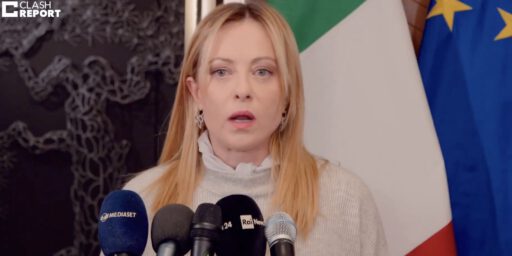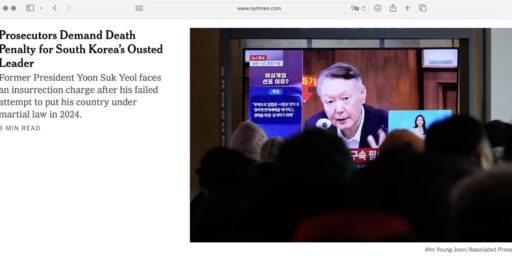NHK:韓国の国会議長「総理大臣か天皇陛下が謝罪を」 Bloomberg: South Korea Lawmaker Seeks Imperial Apology for Japan Sex Slaves

A very provoking statement by Mr. MOON Hee-sang 文喜相, South Korean assembly speaker, the South Korea’s No. 2 elected official, had been made 2 days ago. By calling the actual Japanese Emperor Akihito 天皇明仁 “the son of the main culprit of war crimes” in the year 2019 implies a reaction of cool heads and rational, non-emotional, diplomatic communication. However, as history books are distorted not only on both sides, but also in China and North Korea as well, historians on every side, depending on their ‘political’ color, will regard Moon’s statement either as a minor or a major incident.
Confronting the dark side of its own country’s history should be welcomed and practiced with objectivity and without fear. See the pragmatic attitude and interchange by German and Polish historians regarding the re-editing of their national history books.
I will today refrain from criticizing U.S. or Russian history books, as they are distorted and wrongly written, as well. And, let’s not forget the complexity of the dark history of colonialism.
Personally I regard the official apology ”On the occasion of the 50th anniversary of the war’s end” 戦後50周年の終戦記念日にあたっての村山内閣総理大臣談話 made by then Prime Minister, Socialist MURAYAMA Tomiichi 村山富市 in 1995 as, more or less, satisfactory. I can live with it. And I think the majority of the Japanese population, too.
https://ja.wikipedia.org/wiki/村山内閣総理大臣談話「戦後50周年の終戦記念日にあたって」
Further on, common sense shows that the “Kono Statement” 慰安婦関係調査結果発表に関する河野内閣官房長官談話 from 1993 speaks also the voice of representative Japan.
https://ja.wikipedia.org/wiki/慰安婦関係調査結果発表に関する河野内閣官房長官談話
To not complicate matters regarding socio-historical constellations in Japan, I leave the status quo of the ‘Zainichi’ 在日 aside. The opinions by North Koreans, South Koreans and assimilated ex North Koreans and ex South Koreans, who changed their passport into one with the Emperor’s Chrysanthemum mark, are non-uniformed.
Assimilated Chinese living in Japan offer a different perspective, too.
Eclectic, representative voices cannot be filtered, documented rightly, as they change from time to time, from generation to generation. Fact is, statistics had been manipulated in official Japan.
What the actual Prime Minister ABE Shinzo 安倍晋三 26 years later says, imHo, has almost no value, as I, and in this context every other Japanese too, can relate to MURAYAMA’s 1995 official statement.
Regarding the Japanese Emperor I will refrain from any comment, as Japan itself is divided regarding his role, his masquerade, in society. There exists a big part in the population, who would like to see him quietly living in Kyoto, without any status symbol. And it is also clear to everybody in this country that the right wing party LDP (自民党 with PM Abe) would like to give the Emperor more political and social weight. In this sense, Mr. Moon plays into the hands of the Conservative Political Cast in Japan by taking the social function of the Japanese Emperor System seriously.
The question, if the Showa Emperor 昭和天皇 should had been treated as a War Criminal fills plenty of history books. In abstract terms, compare what happened to Benito Mussolini and Adolf Hitler.
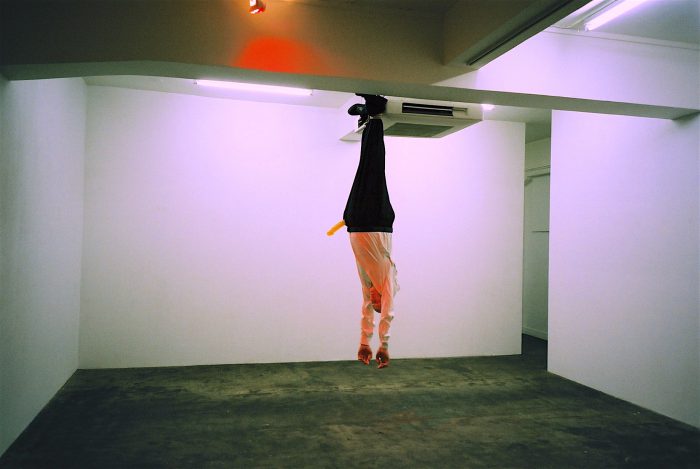
https://marioa.com/works/mizuma-art-gallery-tokyo-mussolini/
as reference, see also:
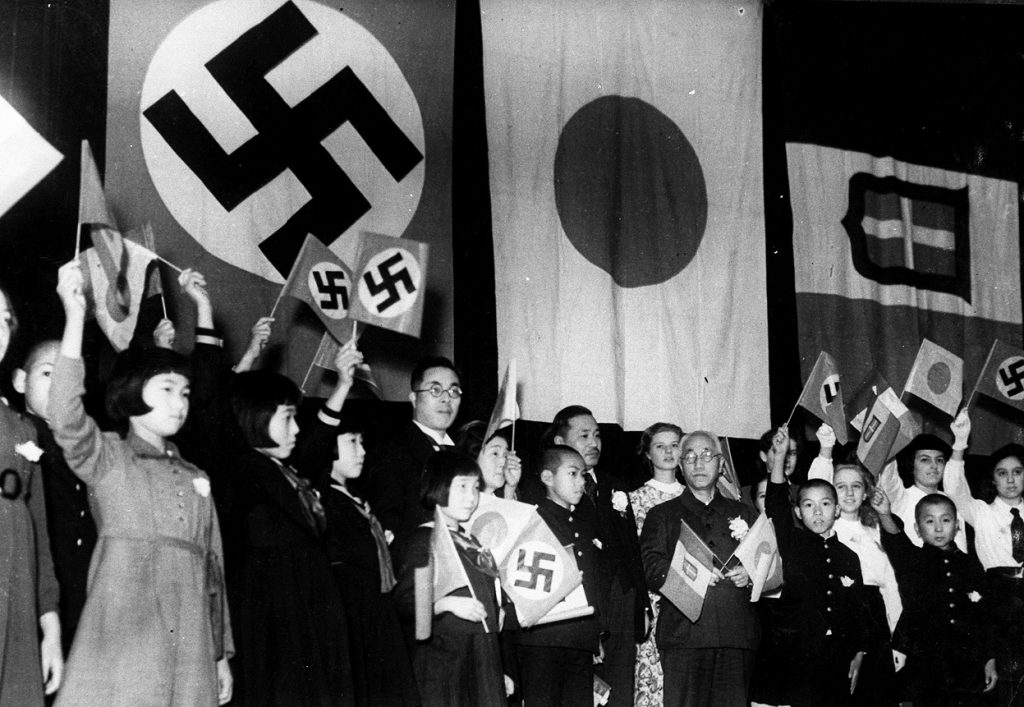
日独伊三国同盟ファシズム:横山大観とベニート・ムッソリーニ
Fascism Axis Japan-Germany-Italy: Nihonga Painter YOKOYAMA Taikan and Benito Mussolini
https://art-culture.world/articles/fascism-axis-japan-germany-italy-nihonga-painter-taikan-yokoyama-and-benito-mussolini/
ROBERTO – the Japan-Germany-Italy fascist axis is well documented. It depends on you, if you want to know the truth.
The wording ‘sex slaves’, may eventually, from the German historical perspective, be endorsed, as in German the same word ‘Feldhure’ exists and is being used.
“Obviously”, Japan’s influential, national public broadcasting organization NHK, which obeys to Prime Minister Abe, skipped the ‘sex slave’ セックス・スレイブ wording, which had been used in the title of the Bloomberg article.
May I hereby mention that I am the first person on earth who published a book on divided South- and North Korea, “Korea – Geteiltes Land” 분단 한국 1988/1989 available in South Korea and in Germany. My research documented in this book sex tourists’ groups coming from neighboring Japan to the island Cheju, and other tourists being captured when openly walking with their hostesses in the city of Seoul.
http://youlhwadang.co.kr/book/1623/
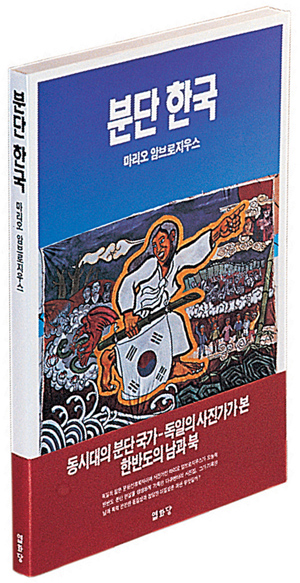
For the record, I attached the original by Bloomberg News and the Japanese ‘translation’ by NHK, Sankei Newspaper and the Asahi Newspaper. As an entrance, to get an overview, the article from the South China Morning Post about the death of former sex slave Kim Bok-dong, two weeks ago on 2019/1/29 will help, too.
Tokyo, Heisei 31, February 10th
Mario A
up-date 2019/8/3, see also:
Intention of censorship by Nagoya’s Mayor KAWAMURA Takashi at the Aichi Triennale 2019
名古屋河村市長 あいちトリエンナーレ 2019の「少女像」展示中止求める意向
https://art-culture.world/articles/intention-of-censorship-by-nagoyas-mayor-kawamura-takashi-at-the-aichi-triennale-2019/
South Korea Lawmaker Seeks Imperial Apology for Japan Sex Slaves
By Youkyung Lee
February 8, 2019, 5:45 PM GMT+9
Updated on February 8, 2019, 6:33 PM GMT+9
Speaker Moon says victims need personal regret from monarch
‘Isn’t he the son of the main culprit of war crimes?’
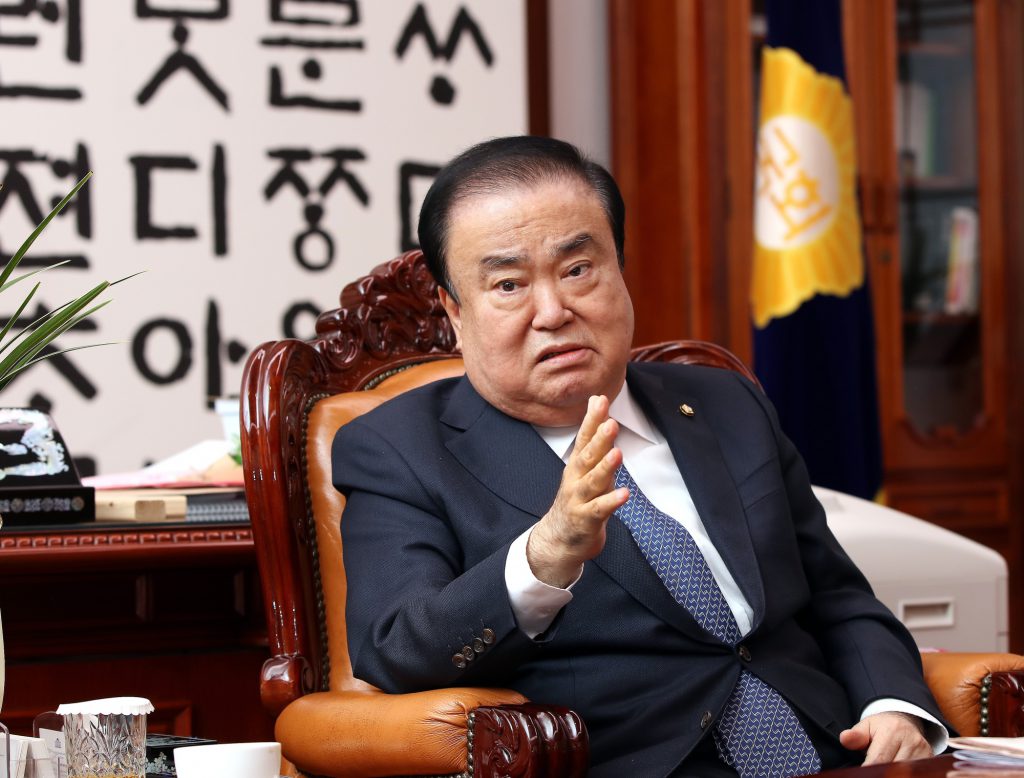
Japan’s emperor should hold hands with women forced to work in the country’s military brothels and make a personal apology if Tokyo wants to end the decades-old dispute, South Korea’s top lawmaker said.
National Assembly Speaker Moon Hee-sang said in an interview Thursday that Japanese Emperor Akihito — as the “the son of the main culprit of war crimes” — should deliver the apology before his planned abdication in May. Moon was asked how the two U.S. allies could resolve a worsening diplomatic feud fueled by disagreements over Japan’s 1910-45 occupation of the Korean Peninsula, much of it under the emperor’s late father, Hirohito.
“It only takes one word from the prime minister, who represents Japan — I wish the emperor would do it since he will step down soon,” said Moon, South Korea’s No. 2 elected official and a former presidential envoy to Japan. “Isn’t he the son of the main culprit of war crimes?
“So, if a person like that holds the hands of the elderly and says he’s really sorry, then that one word will resolve matters once and for all,” he said.
The Japanese prime minister’s office didn’t immediately respond Friday to a request for comment on Moon’s remarks.
The speaker’s comments underscore the widening divide between the neighbors, whose ties have sunk to one of their lowest points in more than half a century. The direct challenge to the emperor — a revered figure, whose father was once considered a living god — risked further angering Japan.
While Akihito offered his “deepest regret” in 1990 for Japan’s colonization of the peninsula, many Koreans argue the country has failed to properly atone for specific wrongdoings, especially forcing local women to serve as “comfort women” in military brothels. Former South Korean President Lee Myung-bak outraged Japan in 2012 when he demanded a fuller apology as a condition for an imperial visit.
The dispute reemerged after President Moon Jae-in was elected in 2017 and moved to undo the comfort women pact his predecessor reached with Japanese Prime Minister Shinzo Abe. After the death of comfort woman-turned-campaigner Kim Bok-dong last month, Moon vowed to do everything in his power to “correct the history” for the 23 surviving victims.
In the interview, Moon Hee-sang said the “most sincere apologies” and compensation fund Abe offered comfort women in the December 2015 deal fell short of the sort of personal contrition German leaders have shown for their own country’s wartime atrocities.
“That is a legal apology,” he said Thursday. “Countries can exchange apologies, but the problem is there are victims.”
Differing Views
More than 90 percent of South Koreans believed that Japan still needed to apologize over the comfort women issue, according to a joint survey of both countries published by the Seoul-based Hankook Daily and Tokyo-based Yomiuri newspaper in July. That compared with less than 8 percent of Japanese who said another statement was necessary.
In 2001, Akihito told reporters that he felt affinity with Korea because one of his ancestors was said to have married a Korean princess. The 85-year-old monarch is due to cede the throne to Crown Prince Naruhito in May, after saying his declining health had made it difficult to carry out his duties.
Moon Hee-sang, 73, has long been a fixture in progressive South Korean political circles and served as a top aide to the current president’s mentor. In July, he was elected speaker of the 300-seat National Assembly, a position of ceremonial rank second only to the president. The pair are not related.
Washington Visit
The speaker will likely be asked about South Korea-Japan ties next week, when he’s slated to lead a multiparty delegation to Washington to meet top U.S. officials including American counterpart Nancy Pelosi. The two sides are also expected to discuss U.S. President Donald Trump’s next meeting with North Korean leader Kim Jong Un later this month in Vietnam.
Moon Hee-sang described the summit as a “great opportunity that arrives once in a thousand years” to establish peace on the peninsula, which been in a state of unresolved war since 1950. Reduced hostilities between the two Koreas would also improve ties with Japan, he said.
The speaker credited Moon Jae-in with bringing Trump and Kim to the negotiating table.
“He is the president who has won trust from the both sides,” Moon Hee-sang said. “The three have a fantastic chemistry.”
— With assistance by Jon Herskovitz, Isabel Reynolds, and Emi Nobuhiro
韓国の国会議長「総理大臣か天皇陛下が謝罪を」
2019年2月9日 18時04分
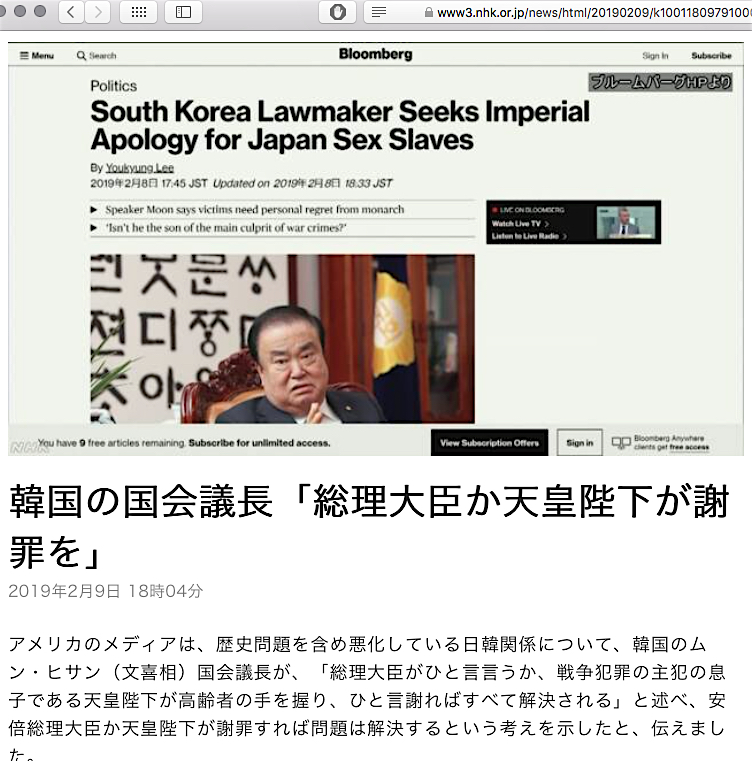
アメリカのメディアは、歴史問題を含め悪化している日韓関係について、韓国のムン・ヒサン(文喜相)国会議長が、「総理大臣がひと言言うか、戦争犯罪の主犯の息子である天皇陛下が高齢者の手を握り、ひと言謝ればすべて解決される」と述べ、安倍総理大臣か天皇陛下が謝罪すれば問題は解決するという考えを示したと、伝えました。
アメリカのブルームバーグは、韓国の国会議員でつくる韓日議員連盟の元会長で、知日派として知られているムン・ヒサン国会議長の発言を伝える記事を8日夜、公式サイトに掲載しました。
この中で、ムン国会議長は、歴史問題を含め悪化している日韓関係を改善するためには何が必要かという問いに対して、「総理大臣からのひと言があればいい。私は退位を控えた天皇陛下が望ましいと思う。戦争犯罪の主犯の息子が、高齢者の手を握り、『本当に申し訳なかった』とひと言言えばすべて解決されるだろう」と述べたと伝えられています。
今回のこの発言について、韓国メディアからは、2012年に当時のイ・ミョンバク(李明博)大統領が「天皇陛下が韓国を訪問するなら日本からの独立運動の犠牲者に謝罪すべきだ」と発言して、日本側の強い反発を招いたことに触れ、日本の国民感情を刺激するものだとして懸念する報道も出ています。
https://www3.nhk.or.jp/news/html/20190209/k10011809791000.html
「天皇が手を握り謝罪すべき」 慰安婦問題で韓国国会議長 米メディアのインタビューで
2019.2.9 14:35
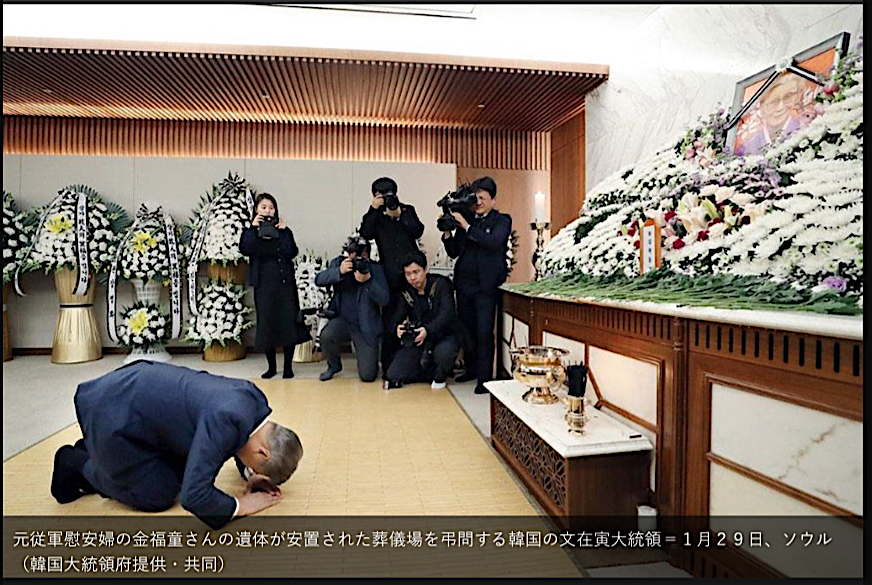
【ソウル=名村隆寛】韓国の文喜相(ムン・ヒサン)国会議長が米ブルームバーグ通信のインタビューで慰安婦問題に触れ、解決には天皇陛下の謝罪が必要との趣旨の発言をし、韓国メディアが9日、発言内容を一斉に報じた。
インタビューの記事は8日報道された。文氏は「一言でいい。首相、もしくは近く退位する天皇が元慰安婦のおばあさんらの手を握り、謝罪の言葉を伝えれば(問題は)すっきりと解決する」と語った。また、天皇陛下について「戦争犯罪の主犯の息子ではないか」とも述べたという。
慰安婦問題をめぐる2015年12月の日韓合意で「日本政府は責任を痛感している」と記されたことについては、「それは法的な謝罪だ。国家間での謝罪はあるが、問題は被害者がいるということだ」と主張。元慰安婦への直接謝罪を訴えた。文氏は04~08年に韓日議員連盟の会長を務めた人物。
https://www.sankei.com/world/news/190209/wor1902090010-n1.html
韓国議長「天皇の直接謝罪で慰安婦問題は解決できる」
ソウル=武田肇 2019年2月9日19時35分
韓国の文喜相(ムンヒサン)国会議長は7日に行われた米ブルームバーグ通信とのインタビューで、日韓の懸案である慰安婦問題について、天皇が元慰安婦に直接謝罪をすれば解決できるとの考えを示した。同通信は、文氏が天皇を「戦争犯罪の主犯の息子」と呼んだとも報じたが、インタビューに同席した国会報道官はこの表現は否定している。
同通信は文氏に対するインタビュー記事を8日に、英語と日本語で配信した。それによると、文氏は「(元慰安婦への謝罪は)一言でいいのだ。日本を代表する首相か、間もなく退位される天皇が望ましいと思う」と主張。さらに、「その方(天皇)は戦争犯罪に関わった主犯の息子ではないか。おばあさんの手を握り、申し訳なかったと一言言えば、問題は解消されるだろう」と語ったという。
国会報道官は朝日新聞に「他の同席者にも確認したが、文氏は(天皇に関し)『戦争犯罪』という表現は使っておらず、『戦争当時の天皇の息子』と述べたと思う」と記事が引用した文氏の発言を一部否定。「天皇が訪韓の意思を明らかにしており、元慰安婦の手を握って謝罪すれば、心のしこりが解けるのではないかというのが文氏の趣旨だった」と説明した。
more at:
https://www.asahi.com/articles/ASM2952SWM29UHBI01S.html
Kim Bok-dong, the vocal South Korean ‘comfort woman’ who demanded justice for other victims, dies aged 92
• President Moon Jae-in paid tribute to Kim, whose death is likely to galvanise Seoul’s determination to hold Tokyo to account
• Ties between Seoul and Tokyo are at the lowest ebb for many years due to the enduring legacy of war and territorial disputes
Tuesday, 29 January, 2019, 1:28pm
By Park Chan-kong in South China Morning Post
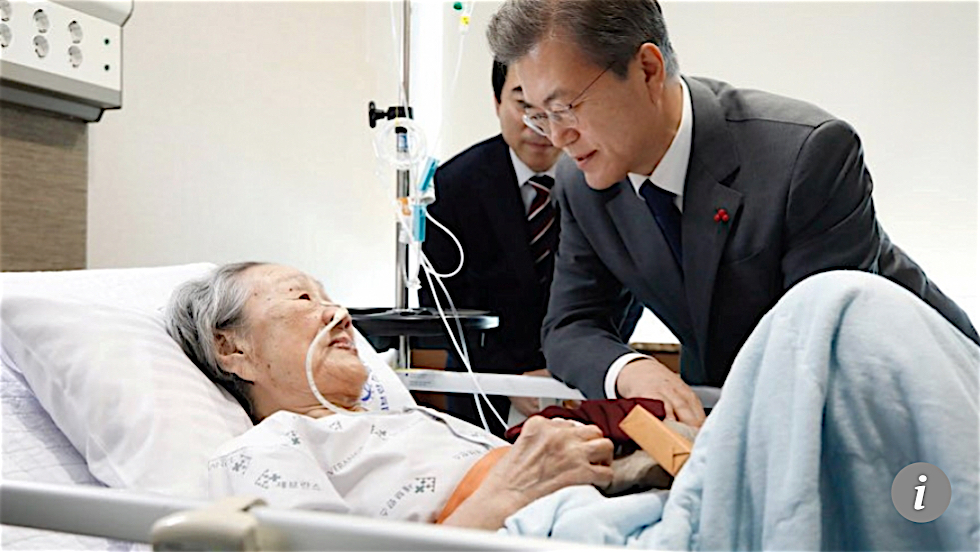
Kim Bok-dong, one of South Korea’s most prominent survivors of wartime sexual slavery under Japanese rule, has died aged 92, further galvanising Seoul’s determination to seek justice for the country’s “comfort women”.
Kim, who achieved international renown for her human rights activism, died in hospital on Monday, according to the Korean Council for Justice and Remembrance.
President Moon Jae-in wrote on his Facebook page that her testimony at the UN Human Rights Committee in 1993 “brought light to the hidden history” and gave others “courage to face the truth”.
“We will never forget to set [distorted] history right,” Moon wrote, praising Kim for refusing to be portrayed as a victim, instead “pushing for an apology over imperial Japan’s atrocities and legal compensations”.
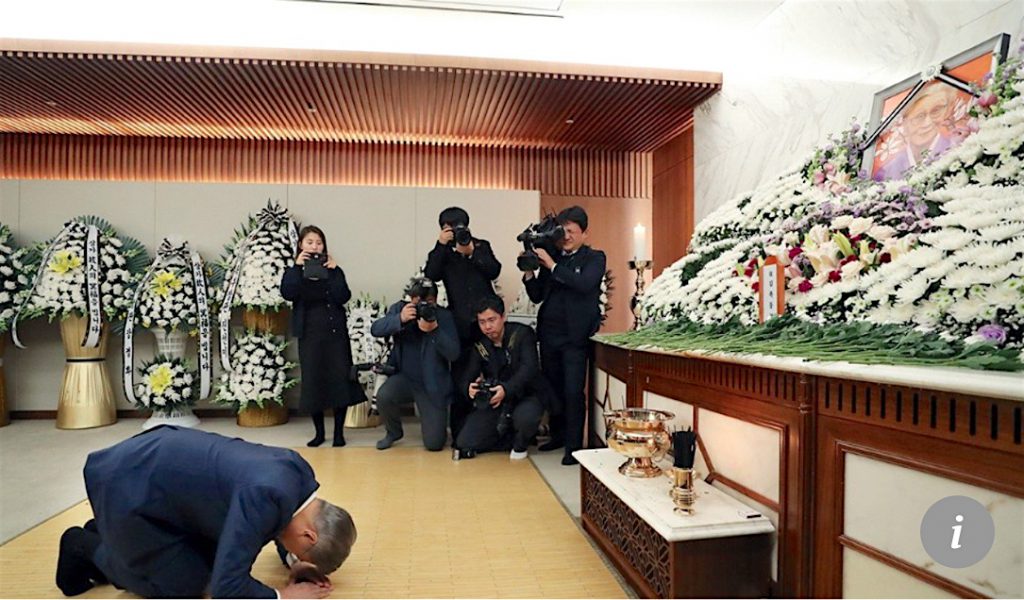
Japan controlled the Korean peninsula from 1910-45. During this period, South Korean women were forced into sexual slavery and labourers were made to work for Japanese firms.
Kim died several years after being diagnosed with cancer and just hours after another elderly victim died, although her name has been withheld. There are now only 23 South Korean survivors of Japan’s wartime sexual slavery.
Kim Bok-dong first testified to her experiences in 1992, one year after Kim Hak-soon became the first South Korean woman to speak publicly about the sexual slavery she endured under Japanese rule. Kim Bok-dong travelled to Europe, the US and Japan to share her story and campaign on behalf of other victims of sexual assault in conflict zones.
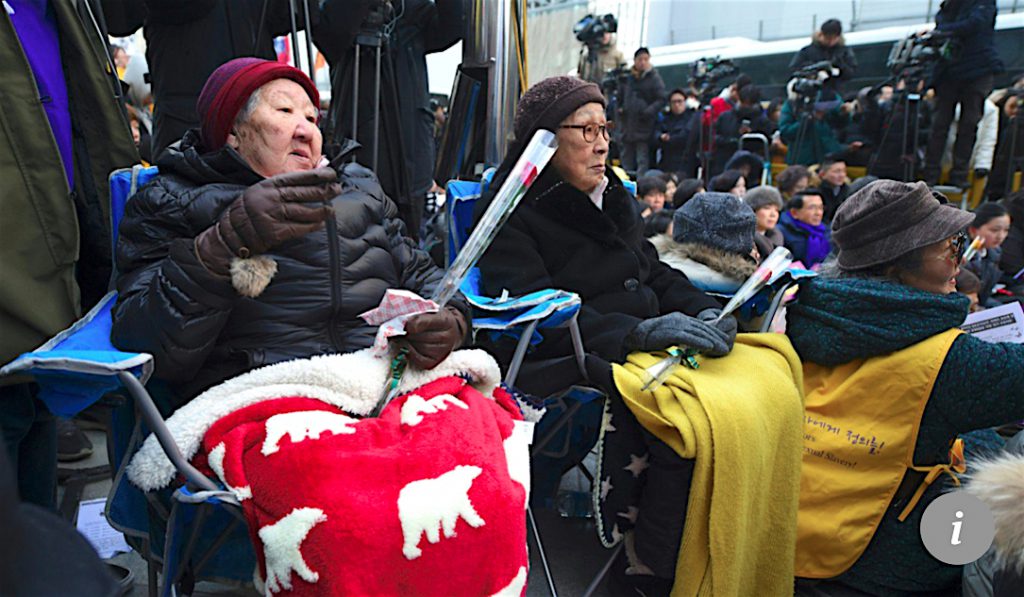
“I am very much aware of their agonising pain … I want to help these women in many parts of the world who have been sexually violated,” she said in 2012.
Her funeral will take place in Seoul on Friday and a traditional farewell road ceremony – in which mourners assemble to pray at a place often visited by the deceased – is planned near the Japanese embassy.
Professor Lee Won-deok, an expert on Japanese-Korean relations from Kukmin University, described Kim as “a treasure” for activists seeking to hold Japan accountable.
“She was highly active in sharing her experiences with international audiences and campaigning for women’s rights here and abroad,” Lee said. “For Japan, the comfort women issue is like a thorn in the eyes as it endeavours to project its soft power in the international community.”
Tokyo insists the “comfort women” issue was resolved when both nations signed a deal in 2015 during Park Geun-hye’s presidency. Seoul subsequently abandoned the deal, declaring it “flawed”.
On the sidelines of the World Economic Forum meeting in Davos last week, South Korean Foreign Minister Kang Kyung-wha said Seoul would this year host an international conference on sexual violence in conflict zones “to make sure that their historical experience is not lost”.
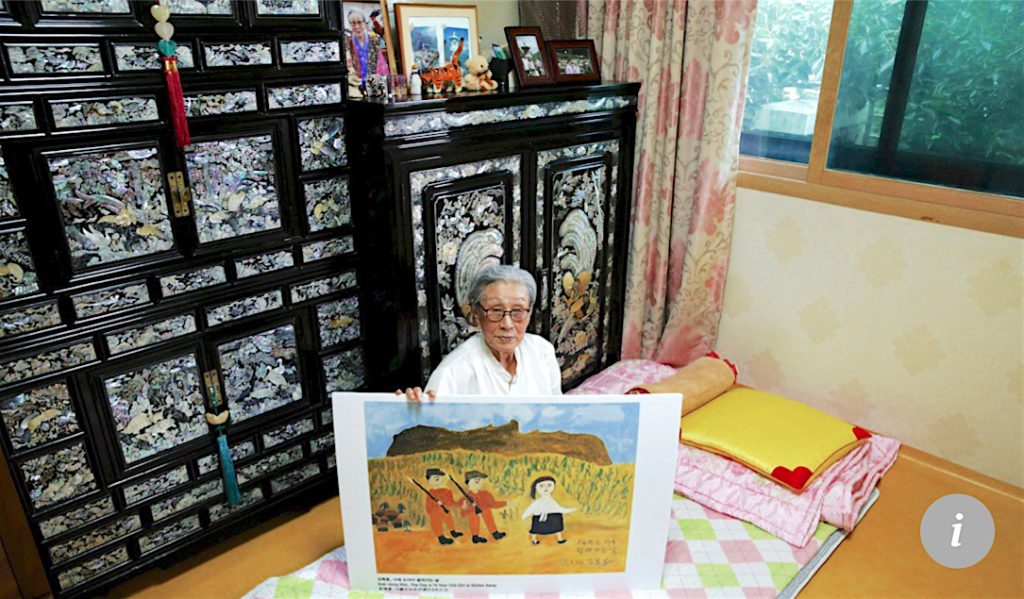
If Seoul uses the conference as a platform to highlight Japan’s wartime atrocities, it is likely to deepen the animosity between the two countries, where ties are already at the lowest ebb for many years due to the enduring legacy of war and territorial disputes.
However, Yoon Sung-Suk, a professor of political science at Chonnam National University, said the diplomatic rift was unlikely to seriously undermine the regional security alliances pursued by the two countries in partnership with the US.
“The current verbal spat involving the two countries’ leaders is hardly more than a political reality show aimed to garner popular support for their governments and policies,” Yoon said.
“Both governments know very well they can’t escalate their rows beyond certain limits as they need each other’s cooperation in addressing their own problems: the nuclear-armed North Korea for South Korea, and regional stability and defence for Japan.”
This article appeared in the South China Morning Post print edition as: ‘Comfort woman’ was leader in effort to heal old wounds
https://www.scmp.com/news/asia/east-asia/article/2184062/kim-bok-dong-vocal-south-korean-comfort-woman-who-demanded
up-date 2019/2/11 16:30
Foreign Minister Taro Kono warns South Korean Lawmaker on Emperor remark
Japan Times / BLOOMBERG, FEB 11, 2019
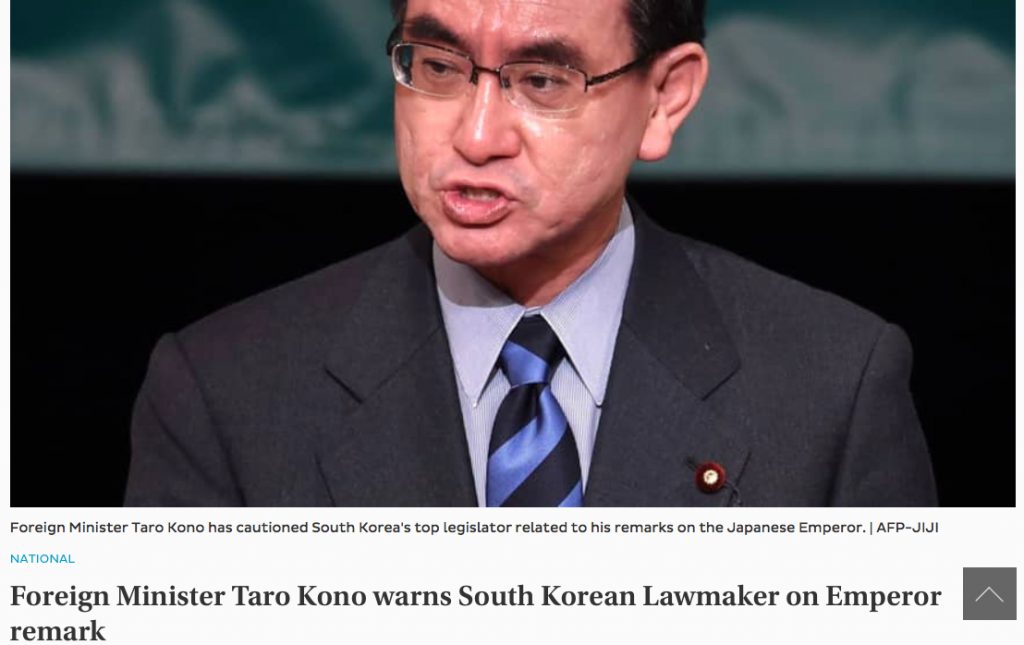
Foreign Minister Taro Kono cautioned South Korea’s top legislator against making divisive remarks after the lawmaker urged the Japanese Emperor to make a personal apology to women forced to work in the country’s military brothels.
Kono was responding to a question Sunday about South Korean National Assembly Speaker Moon Hee-sang’s comments in a Bloomberg News interview last week. In it, Moon said he wanted Emperor Akihito, 85, to hold hands with the elderly former “comfort women” and apologize as “the son of the main culprit of war crimes.”
“I want him to be careful about his statements,” Kono told reporters during a visit to the Philippines, according to a transcript posted on the Foreign Ministry’s website. Kono said the comfort women dispute was resolved “fully and finally” by a 2015 agreement, in which Prime Minister Shinzo Abe offered victims “most sincere apologies” and created a compensation fund.
“South Korea is not seeking a renegotiation or anything else,” Kono said. “I would like him to make statements based on a correct perception in the future.”
The South Korean Ministry of Foreign Affairs said in a separate statement Monday that Moon’s remarks were intended to emphasize the suffering of the victims and that the country was committed to “future-oriented” ties. “Japan needs to show sincerity for honor, dignity and to heal the emotional pain of the victims based on a victim-centered approach,” the ministry said.
Moon’s remarks drew widespread criticism in Japan, which was already sparring with South Korea over a host of disagreements stemming from its 1910-45 occupation of the peninsula. South Korean President Moon Jae-in has moved to undo the comfort women pact, which was agreed to by his predecessor, and vowed to do everything in his power to “correct the history” for the 23 surviving victims.
The comments by Moon Hee-sang — South Korea’s No. 2 elected official and a former presidential envoy to Japan — came in response to a question about how the two U.S. allies could resolve the feud. He’s not related to the president.
“It only takes one word from the prime minister, who represents Japan — I wish the emperor would do it since he will step down soon,” the speaker said. “Isn’t he the son of the main culprit of war crimes? So, if a person like that holds the hands of the elderly and says he’s really sorry, then that one word will resolve matters once and for all.”
Many in Japan believe the country has apologized enough, with less than 8 percent of respondents surveyed by the Seoul-based Hankook Daily and Tokyo-based Yomiuri Shimbun in July agreeing that another statement was necessary. That compared with 90 percent of South Koreans who wanted another apology.
Moon Hee-sang’s remarks represented a direct challenge to the Emperor, a revered figure, whose father, wartime Emperor Hirohito — who is posthumously called Emperor Showa — was once considered a living god.
“If these remarks are true, I can’t tolerate them at all, no matter how you put them,” lawmaker Masahisa Sato, a member of the Liberal Democratic Party and a former commander of peacekeeping forces in Iraq, wrote on Twitter.
https://www.japantimes.co.jp/news/2019/02/11/national/foreign-minister-taro-kono-warns-south-korean-lawmaker-emperor-remark/#.XGEffuIzaqA
up-date:
EDITORIAL: Facing up to century-long history of knotty ties with Korea
Asahi Shimbun, February 11, 2019
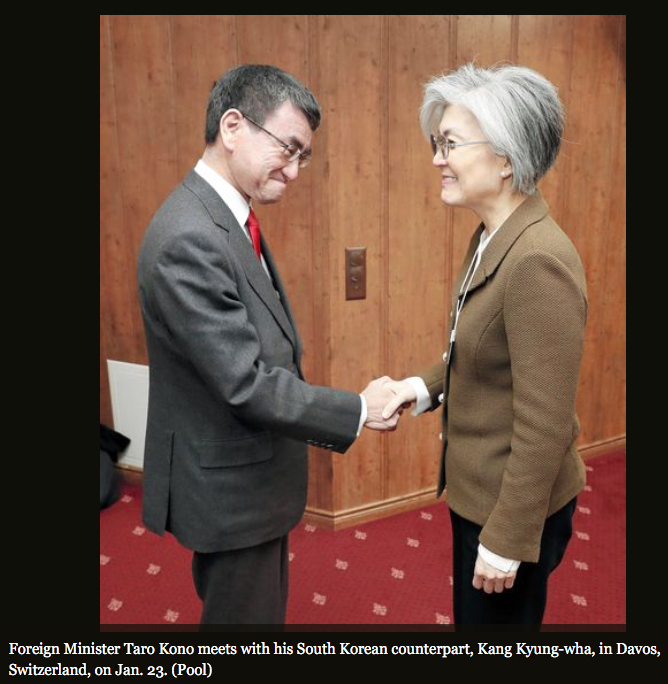
A declaration was adopted in Tokyo on Feb. 8 a century ago by a group of young Koreans, whose country was under Japan’s colonial rule. The document, known as the “Feb. 8 Declaration,” called for Korea’s independence.
The youths who gathered for the event were detained by police, who rushed to the spot. The actions of those young people that day triggered Korea’s largest independence campaign the following month, remembered as the March 1 Movement, across the peninsula, which, in turn, inspired a popular movement in China.
The declaration refers to a deep thirst for ethnic self-determination. It says Japan’s 1910 annexation of Korea was not based on the will of the Koreans and stated, “Our people … will definitely contribute to world peace and humankind’s culture when they have built a new nation.”
During postwar diplomatic normalization talks between Tokyo and Seoul, arguments raged on both sides over the lawfulness of Japan’s annexation of Korea, and the issue ended up being settled in a vague manner. That was a political decision aimed at purely prioritizing an improvement in bilateral ties.
That said, a 2010 statement by Prime Minister Naoto Kan, which his Cabinet approved on the occasion of the centenary of annexation, stated that the Korean people were deprived of their country and culture under Japan’s rule, which was imposed against their will.
The issue of shared history continues to rattle ties between Japan and South Korea, as well as national sentiment on both sides of the strait. In recent months and years, new friction has flared, among other things, over decisions by South Korean courts ordering Japanese firms to compensate Koreans for their wartime labor and Seoul’s reluctance to implement a 2015 bilateral agreement on the “comfort women” issue.
There is, however, another side to history that should not be overlooked.
Japan and South Korea have steadily built up mutual cooperation over more than half of the past century that has elapsed since the Feb. 8 Declaration.
Tokyo and Seoul have deepened their socioeconomic ties under the framework of diplomatic relations they established in the mid-1960s. There have certainly been ebbs and flows of national sentiment on occasion, but there are enormously more opportunities now for personal interactions between Japanese and South Koreans in such diverse areas as business, sports, school education, tourism and daily life.
It is all too natural for one to feel disappointed when a process of reconciliation, accrued over time, has come to a halt or is reversed.
Given that, one should still face up to history as it is. Japan should not end its readiness to work in good faith on problems that have derived from its mistakes of the past.
South Koreans are invited to turn their eyes toward the bright side of history as well and ponder the future of bilateral ties.
President Moon Jae-in of South Korea is seeking to organize a joint event with North Korea to commemorate the upcoming centenary of the March 1 Movement. It would certainly make sense to confirm mutual ties between fellow Koreans on the back of the recent trend of inter-Korea rapprochement.
Moon should, however, refrain from facing Japan too judgmentally and stirring up national emotions.
Along with lessons to be learned from the past, a cooperative spirit for carving out the future is also indispensable for the stability of Northeast Asia, which Moon is so eager to ensure.
http://www.asahi.com/ajw/articles/AJ201902110019.html
Hibakusha: After lengthy wait, 92-yr-old S. Korean man receives A-bomb survivor’s certificate
February 11, 2019 (Mainichi Japan)
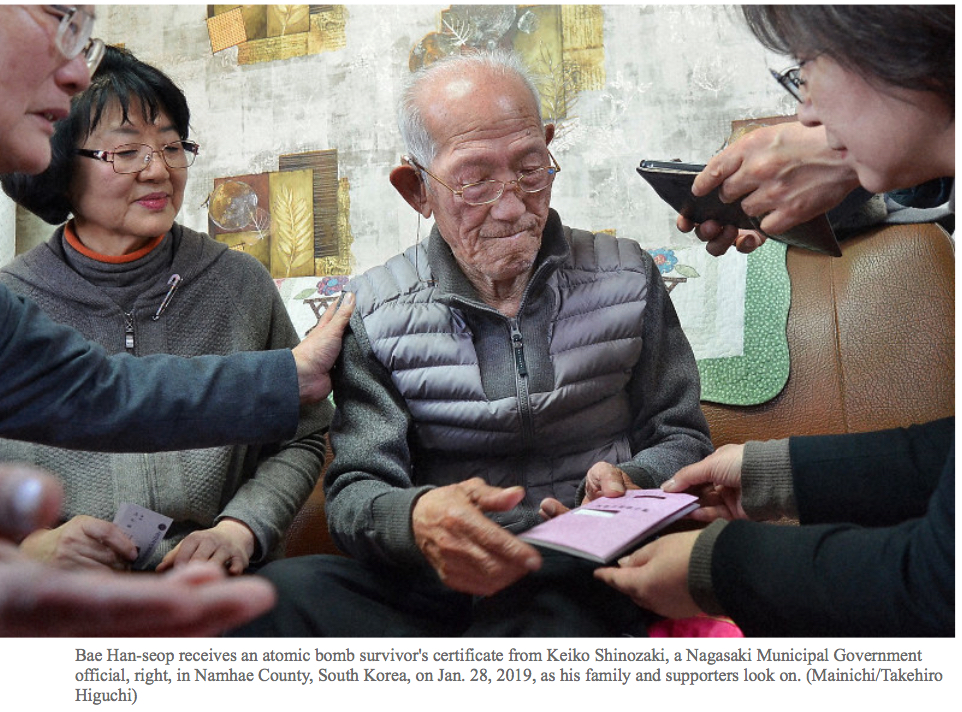
FUKUOKA — A 92-year-old South Korean man who survived the 1945 U.S. atomic bombing of Nagasaki received an A-bomb survivor’s certificate from the city of Nagasaki in western Japan on Jan. 28, nearly 74 years after the nuclear catastrophe and four years after he applied for the recognition.
When passing the certification to Bae Han-seop at his home in the southern South Korean county of Namhae, Keiko Shinozaki, a Nagasaki Municipal Government official, read out a letter from Nagasaki Mayor Tomihisa Taue saying, “I am sorry it took a trial and a long time before the issuance of this certificate.” Bae, however, couldn’t hear the statement as he had lost his hearing after suffering from a stroke in the summer of 2018, when his lawsuit seeking the recognition was still pending in court.
Bae was injured in the atomic blast on Aug. 9, 1945, while he was at his dormitory after being conscripted to work at Mitsubishi Heavy Industries (MHI) Nagasaki Shipyard the year before. Decades later, when he filed an application for the survivor’s certificate in May 2015, the Nagasaki Municipal Government rejected his request, stating that “the credibility of his testimony is dubious and there is no evidence backing it.”
In September the next year, Bae filed a suit against the city demanding it nullify the rejection of his application. On Jan. 8 this year, the Nagasaki District Court ordered the city to grant the certification to the plaintiff, saying “his testimony is trustworthy.”
Even though Bae can hardly speak now as his cognitive and verbal functions have deteriorated due to the stroke, his testimony was consistent when this writer interviewed him on two occasions — once in July 2015, shortly after he filed for the survivor’s recognition, and then again two years after that.
In 1939, Bae moved from the southern Korean Peninsula to the Fukuoka Prefecture city of Yahata (present-day Kitakyushu) in western Japan, where his elder sister was living. As World War II progressed, he was forced to work at the MHI Nagasaki Shipyard from April 1944 and was engaged in work to join steel plates together by driving heated tacks.
While being interviewed, Bae recounted the details of his work by drawing a rough sketch of the shipyard. “This is the dock and a machinery plant was here, and there was a hospital around here …”
On the morning of Aug. 9, 1945, he was heading to the dining hall of his dormitory following a night shift, when the atomic bomb was detonated at 11:02 a.m. about 5.5 kilometers away. “Things like stones flew over to where I was. I lay low quickly while covering my eyes and ears, but something hard hit my lower back. It ached so much that I fainted,” he said, recalling the impact of the blast. He showed this writer his hollowed scars by flipping up his shirt.
The Japanese government began to issue A-bomb survivor’s certificates in 1957, providing medical and other assistance to victims. However, Bae, who was back in his hometown farming and fishing after the war, wasn’t aware of the move.
It was 70 years after the atomic bombing that he finally got to apply for the certification with the help of his support groups in Japan, but his local compatriots who knew about his Nagasaki bombing experience had passed away, making it impossible for Bae to find witnesses or evidence sought by the Japanese government to support his claims.
Undaunted, Bae strived hard to recall what he had gone through and testified on the situation at the time of the bombing over and over when he applied for the certification and during the trial, but the Nagasaki government dismissed his testimony, saying it was “inconsistent.”
“It is utterly frustrating,” Bae fumed at the time.
On Jan. 28 this year, the Nagasaki city official who visited Bae at his home to grant the certificate had conversations with his family and support group members for about 40 minutes. Unable to hear what was being talked about, Bae repeatedly gave gestures as if to suggest his bewilderment, and groaned intermittently.
The sight reminded me of Bae’s pleas during past interviews, saying in Japanese, “It’s not a lie, it’s true.”
(Japanese original by Takehiro Higuchi, Kyushu News Department)
http://mainichi.jp/english/articles/20190211/p2a/00m/0fe/015000c
up-date 2019/2/12
Japan wants apology from S. Korea over emperor remark
THE ASAHI SHIMBUN
February 12, 2019 at 15:15 JST
Prime Minister Shinzo Abe on Feb. 12 said Japan has lodged a strong protest with South Korea over the National Assembly speaker’s remark that the “comfort women” issue would be resolved with an apology from Emperor Akihito.
Speaking at the Lower House Budget Committee session, Abe said, “I was very surprised. It (the remark) contained blatantly inappropriate content, and we expressed a strong protest (to South Korea) and emphasized the fact that it was extremely regrettable.”
Abe referred to an interview that National Assembly Speaker Moon Hee-sang gave to a U.S. news wire service in which he said that the longstanding issue would be resolved if Akihito apologized directly to the women, who were forced to provide sex to Japanese military personnel before and during World War II.
At his Feb. 12 news conference, Chief Cabinet Secretary Yoshihide Suga said that a Foreign Ministry director-general submitted the protest to the South Korean government on Feb. 8 and that Ambassador Yasumasa Nagamine further explained the government’s disapproval the following day to the first vice minister at the South Korean Foreign Ministry.
Suga said that South Korean officials explained that Moon made the statement with the hope of improving bilateral relations as quickly as possible and that the report did not accurately reflect the National Assembly speaker’s true intentions.
But Suga said neither an apology or retraction of the comment was made.
http://www.asahi.com/ajw/articles/AJ201902120036.html
韓国国会議長発言に強く抗議 謝罪と撤回を要求
2019年2月12日 18時10分
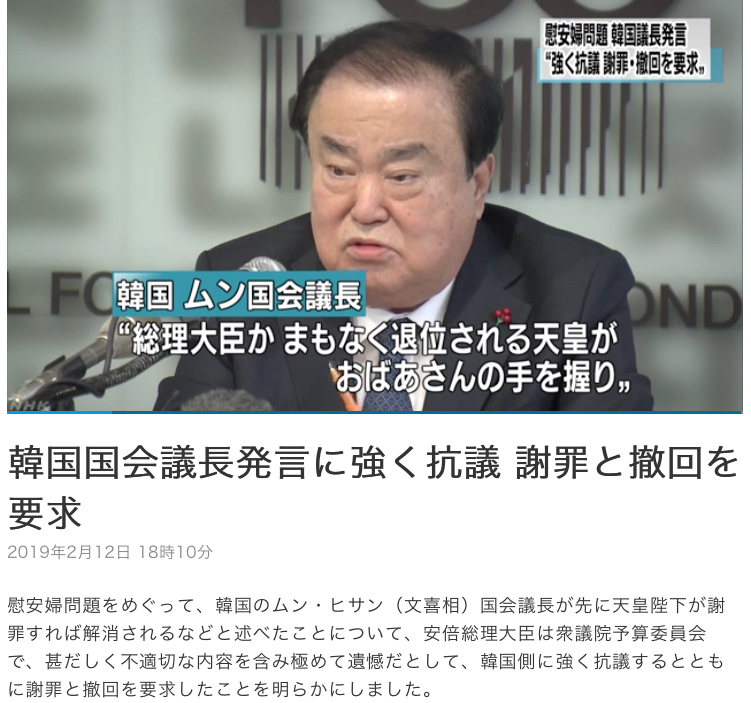
慰安婦問題をめぐって、韓国のムン・ヒサン(文喜相)国会議長が先に天皇陛下が謝罪すれば解消されるなどと述べたことについて、安倍総理大臣は衆議院予算委員会で、甚だしく不適切な内容を含み極めて遺憾だとして、韓国側に強く抗議するとともに謝罪と撤回を要求したことを明らかにしました。
慰安婦問題をめぐって、韓国のムン・ヒサン国会議長は先にアメリカのメディアのインタビューで、「総理大臣か、まもなく退位される天皇が、おばあさんの手を握り、『本当に申し訳なかった』とひと言言えば、すっかり解消されるであろう」などと述べました。
これについて、安倍総理大臣は衆議院予算委員会で、「この発言を読んで本当に驚いたところだ。わが国として、直ちに外交ルートを通じ、韓国側に対して、今回のムン・ヒサン議長の発言は甚だしく不適切な内容を含むものであり、極めて遺憾である旨、厳しく申し入れを行った。強く抗議をするとともに謝罪と撤回を求めたところだ」と述べました。
官房長官 外交ルートを通じて抗議
菅官房長官は記者会見で、外交ルートを通じて抗議し、謝罪と撤回を求めたことを明らかにしました。
菅官房長官は閣議のあとの記者会見で、「ハイレベルを含む外交ルートを通じ、韓国側に対して、甚だしく不適切な内容を含むものであり極めて遺憾である旨、厳しく申し入れ、強く抗議した。同時に、謝罪と撤回を求めた」と述べました。
そのうえで、菅官房長官は「ムン・ヒサン議長側は、その後、『日韓関係を重視し、両国の関係が未来志向的に進んでいくことを望んでいる』とした報道資料を発出した。また、韓国政府からも『本件発言が、早期の日韓関係改善を願うムン議長の思いから出たものであり、報道のされかたは同議長の本意ではなかった』という説明があったが、今回のムン議長による発言は極めて不適切なものだ」と述べました。
河野外相「極めて無礼な発言」
河野外務大臣は衆議院予算委員会で、「到底受け入れられるようなものでもないし、極めて無礼な発言であり、政府として、謝罪と撤回を求めているところだ」と述べました。
公明 山口代表「いかがなものか」
公明党の山口代表は記者会見で、「天皇陛下に謝罪を求めるのはいかがなものか。日韓の国民どうしの交流はむしろ活発に行われているので、政治がもっと国民の現実をよく見て両国の関係が円満なものになるよう努力すべきだ」と述べました。
韓国国会議長「論争を望まず」
韓国の国会の報道官によりますと、ムン・ヒサン国会議長は慰安婦問題をめぐってアメリカメディアが伝えた自身のインタビューの内容について、訪問先のワシントンで記者団に対し、「重要な地位にある指導者の誠意ある謝罪を強調する文脈から出た表現だ」と釈明したということです。そのうえで、「日韓両国での不必要な論争を望まないし、起きてはならない」と述べたということです。
一方で、ムン国会議長は、「慰安婦問題は被害者が納得できる誠意ある謝罪が優先されなければならない。日本側は数十回、謝罪したと話すが、私にはそのようには見えない」と述べたということです。
また、韓国外務省のノ・ギュドク報道官は12日の定例記者会見で、「発言は元慰安婦の方々の名誉と尊厳を回復し、そして心の傷を癒やすには、日本側が誠実な姿勢を見せる必要があるという点を強調する趣旨だと理解している」と述べました。そのうえで、韓国政府としてムン議長に対し、謝罪や発言の撤回を勧告するのかという質問に対しては、「われわれの立場は、すでに説明した」と述べ、勧告はしない方針を示唆しました。
共産 志位委員長「現天皇は問題にならず」
共産党の志位委員長は記者会見で、「日本政府として、真剣な謝罪が必要で、特に総理大臣が、みずからの肉声できちんと謝罪しないといけない。天皇は、日本国憲法で政治的権能を有しないとしている。昭和天皇は、戦争の最高責任者だと思っているが、現天皇は戦争責任ということは問題にならないと思う」と述べました。
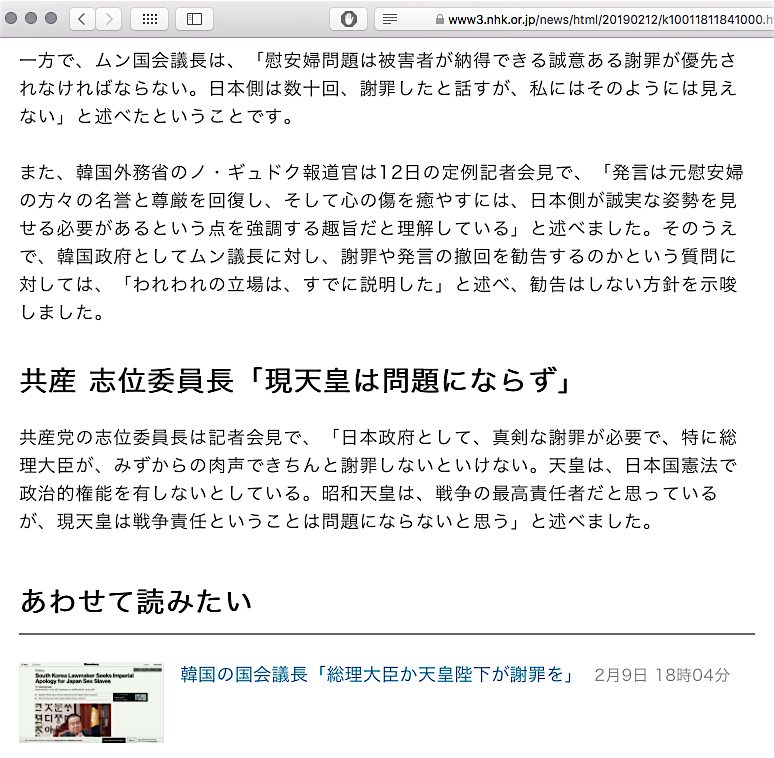
https://www3.nhk.or.jp/news/html/20190212/k10011811841000.html
S. Korean parliament speaker repeats call for Japanese apology
February 12, 2019 (Mainichi Japan)
SEOUL (Kyodo) — South Korean National Assembly Speaker Moon Hee Sang reiterated Monday, during a visit to the United States, that Japan should apologize to Korean women who were forced to work in its wartime military brothels, South Korean media reported.
Asked what he meant last week when he called for Japan’s Emperor Akihito to apologize as “the son of the main culprit of war crimes,” Moon told reporters that it was to “show the importance of an apology from a leader in a responsible position in Japan,” according to Yonhap News Agency.
Moon’s demand for the emperor to apologize over the “comfort women” issue in an interview with Bloomberg on Thursday led Tokyo’s top spokesman to criticize the remarks as “extremely inappropriate” and demand a retraction.
Later Tuesday, a South Korean Foreign Ministry spokesman Noh Kyu Duk told reporters that the government “is assuming that (Moon’s) remarks were made to emphasize that Japanese side should show sincere attitude in the perspective of the victims to recover their honor, dignity and wounded hearts.”
He added that South Korea will strive for improved relations with Japan in the future, while settling controversial issues between the two countries wisely.
The current emperor’s father, Emperor Hirohito, reigned during World War II and is posthumously known as Emperor Showa. Emperor Akihito will abdicate at the end of April.
When asked how South Korea and Japan can end their long-running rows over wartime history, Moon said in the interview, “If a person like that holds the hands of the elderly and says he’s really sorry, then that one word will resolve matters once and for all.”
“It only takes one word from the prime minister, who represents Japan — I wish the emperor would do it since he will step down soon,” Moon was quoted as saying.
Speaking to South Korean media outlets Monday during his U.S. trip, Moon said, “Japan keeps saying that it has apologized tens of times, but for me, not one of those apologies was sincere.” He added, however, that he does not want unnecessary controversies to arise between South Korea and Japan, according to Yonhap.
Ties between Seoul and Tokyo have been bedeviled by issues arising from Japan’s colonial rule of the Korean Peninsula between 1910 and 1945.
The two countries reached an agreement in 2015 aimed at settling the comfort women issue. But a new government in Seoul has since revisited the deal, concluding it could not settle the long-standing issue as it failed to reflect the opinions of surviving victims.
Bilateral ties have been under added pressure since a string of court rulings in South Korea in favor of wartime forced laborers seeking compensation.
http://mainichi.jp/english/articles/20190212/p2g/00m/0fp/058000c
The case of Germany:
Germany’s Merkel visits Holocaust memorial in Jerusalem, vows to fight anti-Semitism
Jeffrey Heller, OCTOBER 4, 2018
JERUSALEM (Reuters) – Head bowed, German Chancellor Angela Merkel paid homage in Jerusalem on Thursday to the six million Jews killed by the Nazis and said Germany had a responsibility to confront anti-Semitism and never to forget the Holocaust.
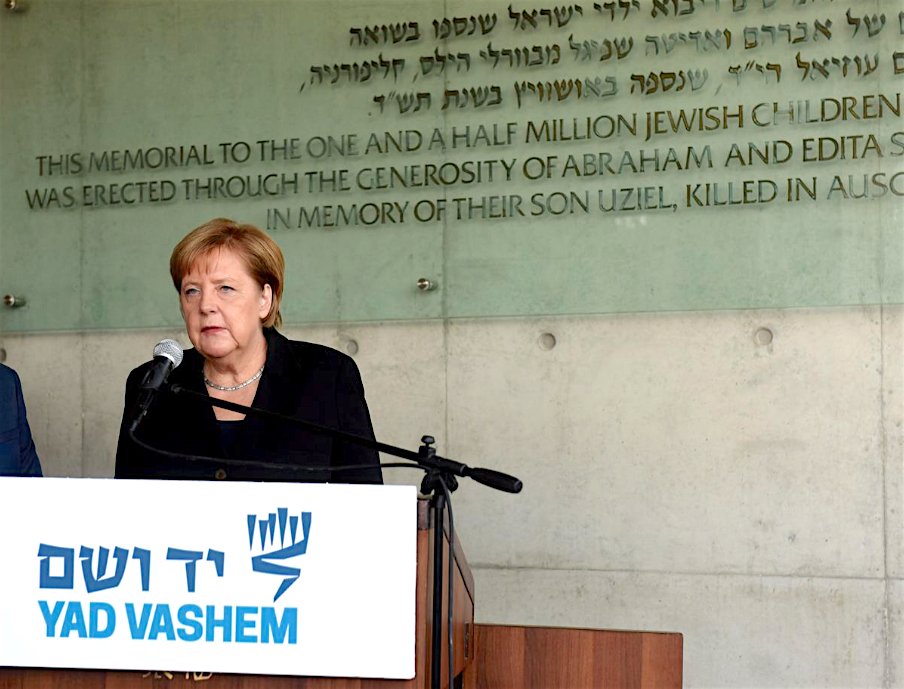
quote:
Merkel began a day of meetings between Israeli and German government officials with a visit to Yad Vashem, Israel’s national Holocaust memorial, where she laid a wreath on a stone slab that contains ashes of death camp victims.
“Almost 80 years ago, on the pogrom night of November 9, Jews in Germany faced unimaginable hate and violence. This was followed by unprecedented crimes against civilization in the form of the Shoah,” Merkel, speaking German and using the Hebrew word for Holocaust, said at Yad Vashem.
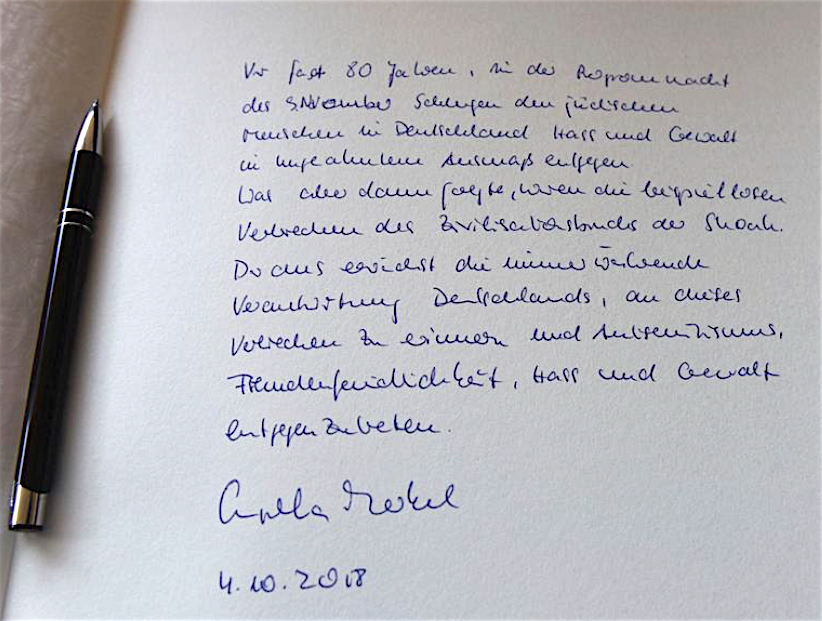
more at:
https://www.reuters.com/article/us-israel-germany/germanys-merkel-visits-holocaust-memorial-in-jerusalem-idUSKCN1ME0RT
up-date 2019/2/15. An unfiltered comment on youtube for Japanese speaking people.
韓国国会議長が天皇陛下に謝罪要求…韓国国民の反応和訳
up-date 2019/11/5:
S. Korea speaker apologizes for wanting emperor to apologize
SEOUL–The speaker of South Korea’s National Assembly apologized for calling on then Emperor Akihito in February to apologize to former “comfort women” to resolve the long-standing controversy over the issue.
Moon Hee-sang was interviewed by The Asahi Shimbun in late October prior to his visit to Japan for a gathering on Nov. 4 of the heads of national assemblies from the Group of 20 member nations.
Regarding his February comment, Moon said, “I would like to transmit my apology to those whose feelings have been hurt.”
The issue of Korean women forced to provide sex to Japanese military personnel before and during World War II has been a contentious one between the two nations for years.
Moon said that despite various agreements and statements, it has yet to be fully resolved.
“One reason are the scars, resentment and sorrow that remains in the hearts of the victims,” Moon said. “I made that comment because I wanted to emphasize that a core factor in resolving the issue would be easing that pain in their hearts.”
He added that he felt the issue could be resolved if there was “a heartfelt apology” from Japan.
The controversial remark came when Moon was being interviewed by a U.S. media organization. In the interview, Moon described Akihito, now the emperor emeritus, as the “son of a war criminal.”
Moon was asked in the Asahi interview what he meant by that remark, but he did not give a direct answer.
Meanwhile, Moon also revealed that he had put together draft legislation to provide support to former wartime Korean laborers who worked for Japanese companies. He said the draft would convince not only the plaintiffs in lawsuits against those companies seeking compensation, but also South Korean public opinion.
more at, full text:
http://www.asahi.com/ajw/articles/AJ201911040027.html
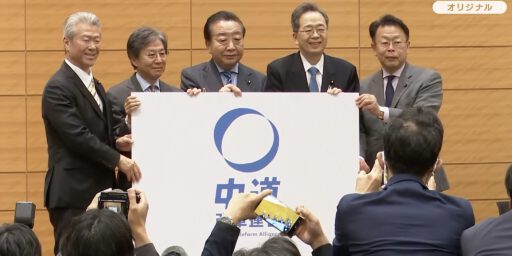
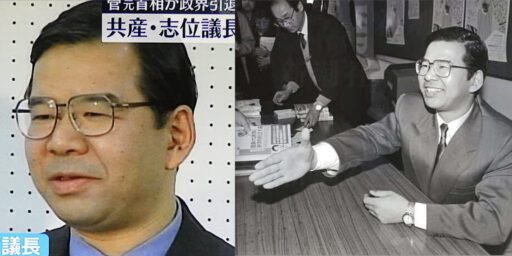
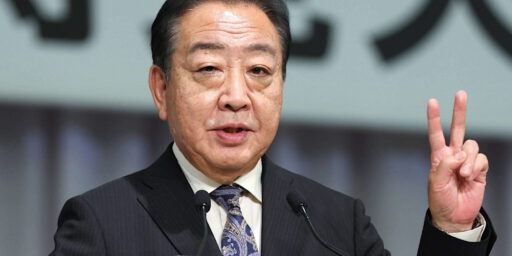

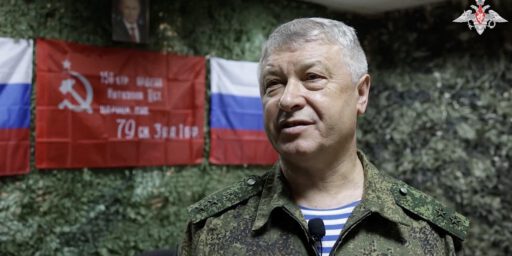
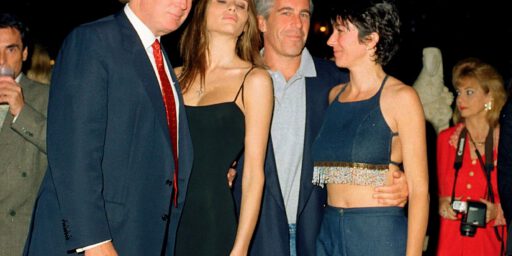
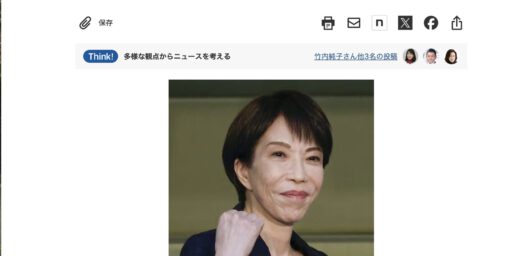
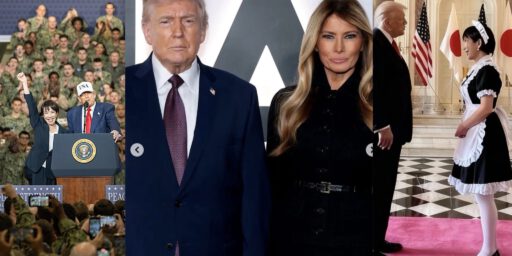
大嫌い--512x256.jpg)
